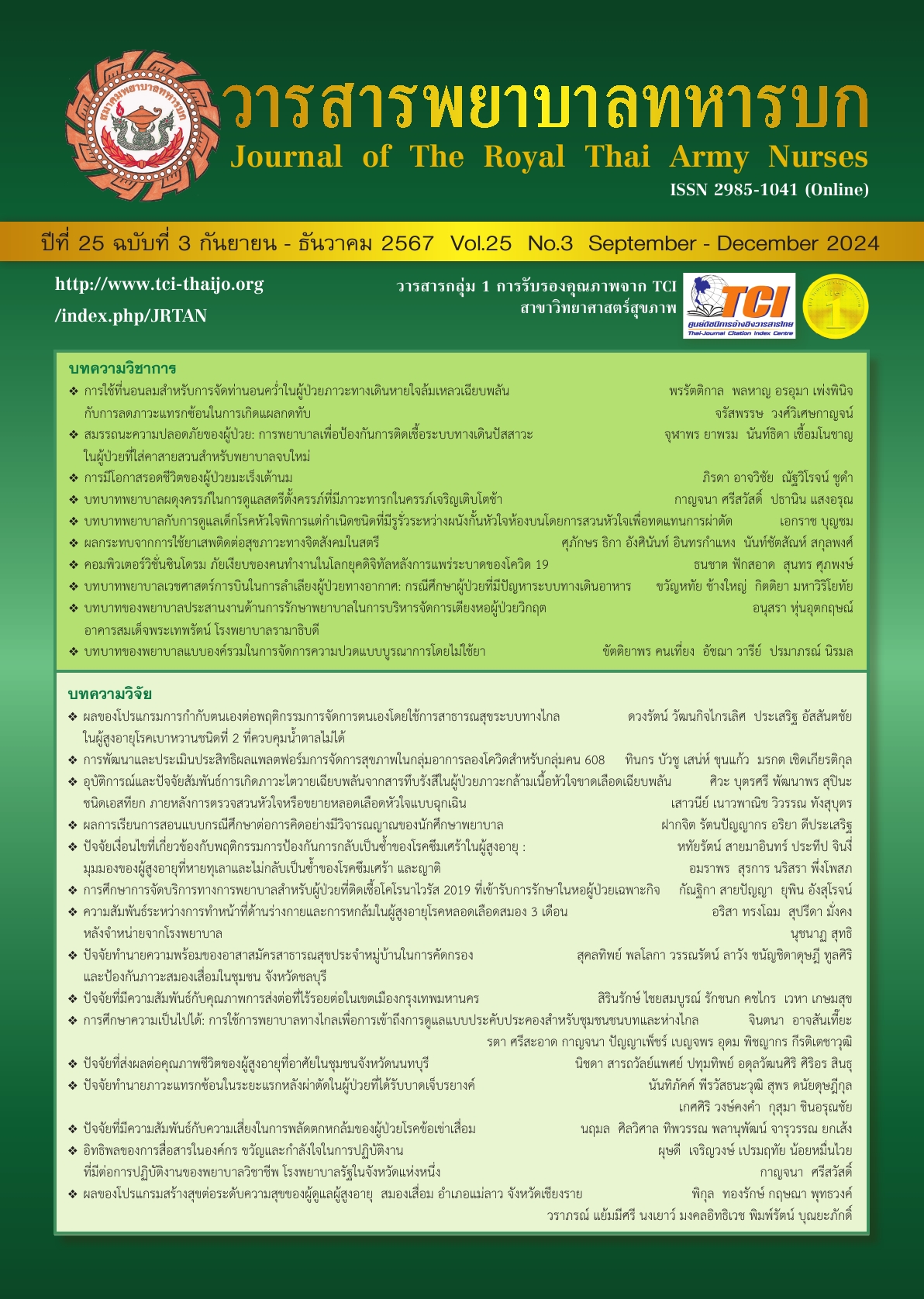Effects of the Self-Efficacy Enhancing Program on Self-Care Behaviors of Patients with Cholangiocarcinoma
Keywords:
Self-Efficacy, self-Care Behaviors, cholangiocarcinomaAbstract
The purpose of this quasi-experimental research was to investigate the effects of the self-efficacy enhancing program on self-care behaviors of patients with cholangiocarcinoma using the of self-efficacy theory. The subjects were 34 patients with cholangiocarcinoma: 17 people in the control group and 17 people in the experimental group. The experimental group participated in the activities to enhance self-efficacy for 45-60 minutes/time for 8 consecutive weeks. The research tool was the self-efficacy enhancing program with 8 activities. Data were collected by a self-care behavior assessment form for patients with cholangiocarcinoma with the Cronbach’s alpha coefficient of 0.92. Data were analyzed by independent t-test and paired t-test. The findings were as follows. (1) The mean score of self-care behaviors of the patients with cholangiocarcinoma promoted with the self-efficacy enhancing program was significantly higher than that of those who did not receive the self-efficacy enhancing promotion at the .01 level. (2) The mean score of self-care behaviors of the patients with cholangiocarcinoma after being promoted with the self-efficacy enhancing program was significantly higher than that of before receiving the program at the .01 level. The results of the study can be used as the guidelines for enhancing self-care behavior of patients with cholangiocarcinoma to have better quality of life.
Downloads
References
The Task Force of Health data and Information, Bureau of Policy and Strategy. Number and mortality rate per 100,000 population based on of the first 10 causes of death group (according to International Statistical Classification of Diseases: 10th Edition) 2021-2023. Thailand: Bureau of Policy and Strategy; 2024. (in Thai)
Chaiteerakit R. Liver and bile duct cancer. Bangkok: Department of Gastroenterology Department of Internal Medicine Faculty of Medicine Chulalongkorn University. 2018. (in Thai)
Cancer Registry Unit, Somdet Phra Yupparat Det Udom Hospital. Statistics of cancer patients admitted in the years 2022-2023. Ubon Ratchathani: Somdet Phra Yupparat Det Udom Hospital Hospital; 2023. (in Thai)
Khuntikeo N, & Pugkhem A. Current Treatment of Cholangiocarcinoma. Srinagarind Medical Journal. 2012; 27(suppl): 340-50. (in Thai)
Pamulila S, Paprom W, & Wamaloon C. Life Scenes of Patients with Cholangiocarcinoma: A Case Study of One Province in The Northeast of Thailand. Journal of The Royal Thai Army Nurses 2020; 21(3): 86-97. (in Thai)
Bandura A. Self-efficacy: Toward a unifying theory of behavioral change. Psychological Review 1977; 84(2): 191–215.
Bandura A. Self-Efficacy: The Exercise of Controle. W.H. Freeman and Company. 1997.
Tamngam P, Pamulila S, Sarakum N, & Inpang S. Knowledge, Attitude, and Consumption Behavior Associated with Cholangiocarcinoma in a Sub-District, Warinchamrab District, Ubon Ratchathani Province. Journal of Nursing Science and Health. 2019; 21(3): 74-85. (in Thai)
Inteng B, & Chomson S. Factors Affecting Stroke Prevention Behaviors of Hypertensive Patients of Muangkao Health Promotion Hospital Phichit Province. EAU Heritage Journal Science and Technology. 2019; 13(1): 122-34. (in Thai)
Turongruang S, Watthana C, Haniratsai T, & Liengchawengwong S. Effects of a Self-efficacy Promoting Program on Disease Control Behaviors and Disease Control among Patients with Uncontrolled Hypertension. Nursing Journal. 2017; 44(1): 69-82. (in Thai)
Jamkrajang T, Boonchun N, & Mala J. The Effectiveness of the Self-efficacy and Social support Enhancement Program on Medication adherence and Blood pressure among Hypertensive Elderly in Community. Journal of The Royal Thai Army Nurses. 2017; 18 (suppl): 270-9. (in Thai)
Wutieay R, & Takaew T. Effects of Self-efficacy Promoting Program on Self-Care Behaviors for Hypertensive Patients in Mae Ing Sub-District, Phukamyao District, Phayao Provice. Thai Journal of Health Education 2021; 44(1): 102-14. (in Thai)
Chiangpiew N, Boonchieng W, & Aungwattan S. Effects of Participatory Learning Regarding Stroke Prevention on Knowledge and Self-Efficacy Among Village Health Volunteers. Nursing Journal. 2018; 45(1): 87-99. (in Thai)
Moradi M, Nasiri M, Jahanshahi M, & Hajiahmadi M. The Effects of a Self Management Program Based on the 5 A’s Model on Self Efficacy among Older Men with Hypertension. Nursing and Midwifery Studies. 2018; 8(1): 21-7.
Poomsanguan K. Health Empowerment: Nurses’ Important Role. Journal of The Royal Thai Army Nurses. 2014; 15(3):86-90. (in Thai)
Downloads
Published
How to Cite
Issue
Section
License
Copyright (c) 2024 Journal of The Royal Thai Army Nurses

This work is licensed under a Creative Commons Attribution-NonCommercial-NoDerivatives 4.0 International License.
บทความหรือข้อคิดเห็นใดใดที่ปรากฏในวารสารพยาบาลทหารบกเป็นวรรณกรรมของผู้เขียน ซึ่งบรรณาธิการหรือสมาคมพยาบาลทหารบก ไม่จำเป็นต้องเห็นด้วย
บทความที่ได้รับการตีพิมพ์เป็นลิขสิทธิ์ของวารสารพยาบาลทหารบก
The ideas and opinions expressed in the Journal of The Royal Thai Army Nurses are those of the authors and not necessarily those
of the editor or Royal Thai Army Nurses Association.






